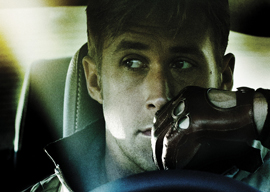
September 21, 2011

The plot swerves when the ex-con arrives home and turns out to be a fine fellow: not a brute at all, but penitent, nervous, and elegant of diction. Oscar Isaac, who can play either Latin American or Middle Eastern, is Hollywood’s New Cliff Curtis (the Maori actor from New Zealand regularly cast as Colombian cartel bosses and Arab terrorists). Yet Isaac, the son of a Miami pulmonologist, brings a refinement to every role. If Orson Welles epitomized the “king actor,” Isaac, who played Prince John in 2010’s Robin Hood, is a prince actor.
You would expect the protagonist in an old noir film to wonder if the damsel in distress isn’t who she seems. Who pressured her husband into committing a crime that wasn’t in his nature? Instead, Gosling’s parfait gentil knight chivalrously offers to help her husband pull one last job to pay off his underworld debt.
While Drive is certainly not lacking in ensuing complications, the sole plot twist that would lift the film to classic status—a confrontation between the hero and his lady love—doesn’t happen. It never seems to occur to anyone that a beautiful woman femme fatale should be self-interested and manipulative.
Would Ms. Mulligan have put her foot down against adding ambiguity and interest to her role? Of course not. Actresses love playing femmes fatales. It’s modern audiences that find them unsettling and unwelcome. Is this feminism’s fault? Probably not. I suspect femmes fatales are too adult of a concept for today’s boyish moviegoers.
Stylistically, Danish director Nicolas Winding Refn has modeled Drive on his favorite 1980s thrillers such as To Live and Die in LA. But Drive appeals mostly to upscale audiences, because the masses can sense its aesthetic self-consciousness.
Oddly, the originals from the Miami Vice era were even more stylized visually. People make fun of the 1980s, but they looked cool. If this were a 1984 movie, every street would be hosed down to reflect the glow of the neon signs that were then coming back into fashion.
Isn’t it about time for another neon revival? Raymond Chandler’s Marlowe said:
I smelled Los Angeles before I got to it.…But the colored lights fooled you. The lights were wonderful. There ought to be a monument to the man who invented neon lights.…There’s a boy who really made something out of nothing.